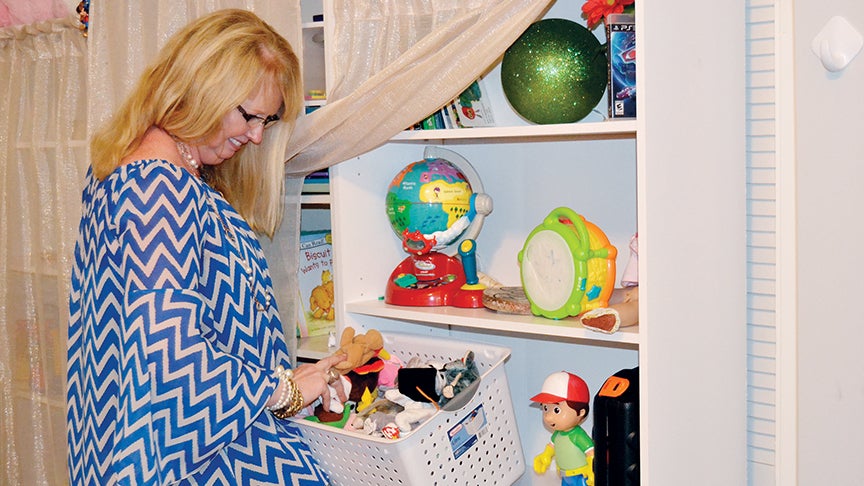Give your home a checkup heading into New Year
Published 1:36 pm Sunday, December 10, 2023

- Photo by Donna Campbell/Professional organizer Diane Ryan shows an easy way to store children’s toys so they can be accessed easily while keeping the bedroom neat and tidy. Ryan held a ribbon-cutting Thursday for The Venue at Five Fifty, which she operates from her home.
RAYMOND, Miss. — Healthy lifestyles and healthy homes may seem like two separate concepts, but both components are important for overall well-being.
David Buys, health specialist with the Mississippi State University Extension Service, encourages people to consider giving their homes a checkup in the new year.
“While many people focus on their physical health at the beginning of a new year, it is just as important to make sure our homes are healthy,” said Buys, who is also an associate professor in the Department of Food Science, Nutrition and Health Promotion. “There are a lot of health hazards our homes can pose.”
Carbon monoxide
Some of these hazards give no warning signs. Carbon monoxide and lead are odorless, invisible contaminants that can cause serious health problems and even death if left unchecked.
Carbon monoxide can be deadly in a matter of minutes if undetected. The colorless, odorless gas is produced any time heating or cooking fuels are burned, including firewood, propane, kerosene, charcoal and natural gas. Running automobiles, engine-powered generators and other gasoline-powered equipment, including lawn mowers, also emits carbon monoxide.
“It is important to have fuel-burning appliances checked by a qualified technician annually and anytime you see signs that this equipment is not functioning properly,” said Buys. “Never leave a vehicle running inside a garage, and don’t use a grill or generator inside a fully or partially enclosed garage or shed.”
To prevent carbon monoxide from rising to deadly levels, all homes with fuel-burning appliances or wood- or gas-burning fireplaces should have working carbon monoxide detectors in the hallway of every separate sleeping area, according to the Environmental Protection Agency.
The U.S. Consumer Product Safety Commission recommends homeowners purchase carbon monoxide detectors that meet the safety standards of the Underwriters Laboratories. These products will be marked with the UL seal. For more information about carbon monoxide, visit the EPA website at http://bit.ly/2bvlqBb.
Lead
Children who live in homes built before 1978 are at risk of lead poisoning from peeling and chipping paint. Very small concentrations of lead can cause irreversible brain damage, behavioral problems and other health issues in children.
“Anyone with children under 6 years old who lives in a home built before 1978 should consider testing for lead,” Buys said. “There are easy, inexpensive cleaning methods that can help control the amounts of lead in the environment once you know where they are.”
To reduce the chances of lead poisoning, the EPA recommends routine cleaning of any lead-based paint chips or dust. Those tasks include:
- Picking up paint chips with a damp paper towel or piece of tape to avoid breaking them into smaller pieces.
- Dusting windowsills and other contaminated surfaces with a damp paper towel and then throw it away.
- Using a vacuum with a high-efficiency particulate air, or HEPA, filter to remove dust from carpet and upholstered furniture.
- Using a damp mop to remove lead-contaminated dust from hard, smooth floors.
For more information about lead poisoning and prevention, visit the EPA website at http://www.epa.gov/lead.
Clutter
Clutter can lead to serious health concerns if small amounts turn into larger amounts, said Jasmine Harris-Speight, Extension educator in the Department of Food Science, Nutrition and Health Promotion.
“Not getting a handle on clutter can turn into unhealthy behaviors associated with hoarding,” Harris-Speight said. “Clutter has a way of sneaking in without you even realizing it.”
Excessive amounts of clutter can make it hard to keep a home clean and tidy, which can trigger allergies and asthma, increase the risk of injury due to tripping and falling over items, lead to pest infestation, and cause mental health complications.
Harris-Speight recommends using the University of Georgia’s Project FIND method to clear clutter. FIND is short for Focusing on Important Necessities in your Dwelling and was designed to help people find money, time, health, happiness and lost items through improved organization.
The method includes five steps to help people declutter:
- Reduce, Recycle, Reuse: Purchase less, recycle and reuse household items. For example, recycle through a local program and begin composting.
- “Shop Local”: Before making a purchase, determine what you already have.
- Enterprise: Try selling unwanted items. Look for consignment stores or use apps.
- “Move”: Pretend to move and purge items that would not be taken to a new residence.
- Donate: Give away items that others could use to local charities, churches or other organizations.
Start small. Begin with a small number of items and decide what is clutter and what is necessary. Ask yourself the following questions to help determine if the item is needed:
- How much space do I have for the items I want to keep?
- Have I used this item in the past few months?
- Does this item serve a purpose?
- Does this item make me feel comfortable?
- Do I have any attachment to this item?
Make a written action plan for decluttering specific items that includes whether to keep, sell or donate the items. Include a date to act for items in the plan.
“It’s okay to take your time. Don’t make a hasty decision that you may regret,” Harris-Speight said. “Ask a friend or family member to help you. This can help alleviate the stress of tackling clutter.”
For more information on Project FIND, visit http://www.find.uga.edu.
MSU Extension is a partner of the Healthy Homes Initiative, which delivers education to improve the health of families, homes and communities. The initiative is a program of the USDA National Institute of Food and Agriculture. For more information or to request a workshop about keeping homes healthy, visit the Extension website at http://extension.msstate.edu/hhi.





